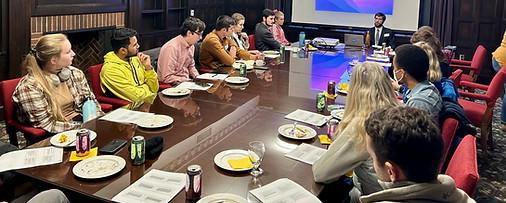top of page
Can a good person always
be a good citizen?
Insights from augustine's "CITY of GOd"
student feedback
An amazing evening surrounded by incredibly intelligent and compassionate peers.
Thanks for creating such a beautiful space!
Medical student

I enjoyed the lecturer's thoughtful discussion of the political, philosophical and theological context of St Augustine's work. The ample context, especially Aristotle's dilemma, helped solidify my interest and capture my attention.
Undergrad Student
I really appreciated the opportunity to meet people from across the university and to spend time
in conversation prior to starting the talk.
Undergrad Student

What I enjoyed most was having a serious scholarly discussion about an influential Christian thinker (Augustine). Obviously, not everyone is going to agree with the ideas presented, but it was nice to have a discussion where those views were presented thoughtfully and respectfully.
Humanities Grad Student

MONDAY, October 17, 2022
Welker room
the michigan union
5:30 to 7:30 pm

Loren Reinoso
Department of Political Science
Yale University
Loren is a political theorist specializing in ethics and histories of political representation, obligation and democracy.
Before Yale, Loren studied at the University of Chicago, where he received an MA in Social Sciences, and at Princeton University, where he received an AB in Politics and a certificate in Values and Public Life.
background reading
A bibliographic review on the meaning of citizenship. The Hedgehog Review, Fall 2008
Isobel Tollenaar. Cicero’s Civitas: Friendship as Fundamental to Citizenship. Senior Thesis, DePaul University, 2019
Jedediah Britton-Purdy. What John Rawls missed. The New Republic, October 2019
Robert Beiner. Citizenship as a comprehensive doctrine. The Hedgehog Review, Fall 2008
Douglas B. Rasmussen & Douglas J. Den Uyl. Did Rawls restore political philosophy? Law & Liberty, April 14, 2021
David P. Goldman. Cicero vs. Augustine on the Republic. First Things, January 2010
Julia Brotea. Standing on the shoulders of medieval men. Leviathan, 2013
Robert P. George. Public Morality, Public Reason. First Things, November 2006
What are we to do when our political obligations as citizens seem to conflict with our moral obligations as persons?
Since Aristotle, the relation between good citizens and good persons has been the driving question of political ethics. Aristotle observed that sometimes a good citizen might be required to act in a way that a good person cannot condone. The question remained relevant over the course of Western history, during which time individual rights developed, strengthened and continually tested political theories and systems.
An enduring and insightful treatment of this dilemma occurs the classical work "The City of God", written in the 5th century by Augustine of Hippo. For Augustine, the problem isn't the distinction between moral and political "obligations" per se. He frames the problem by considering the human will: What do we desire? What motivates our actions? For Augustine, our desires define our "citizenship".
For Augustine, the "City of Man" is built on self interest, while the "City of God" is built on love for God and for others. This talk will briefly confront the classical arguments offered by Aristotle and Augustine with two later political thinkers - Thomas Hobbes and John Rawls - to approach the question:
What to do when a citizen's personal values seem to conflict with their public obligations?
this event is free to university of michigan students & faculty
registration required
DINNER offered!
bottom of page
